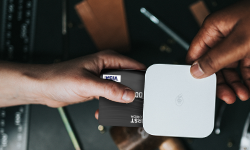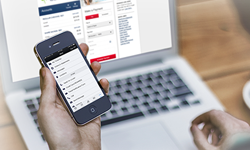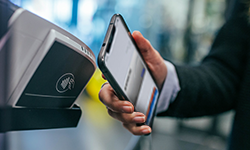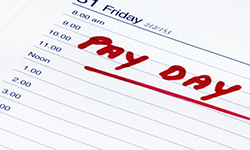It's hurricane season. Living in the Florida panhandle, hurricanes are a yearly threat running from the first week of June to the end of November. Experienced residents who have lived through multiple hurricanes know it's a smart idea to prepare for the coming hurricane season well in advance. But stocking up on water and non-perishable food items aren't the only things you need to do to prepare for a potential crisis. Making financial preparations early on not only saves you from the last-minute rush and long lines at your financial institution, but it allows you to focus more on what matters most — you and the safety of your loved ones — when a storm hits.
We’re sharing a few steps you can take to prepare your finances for hurricane season:

Build up your emergency savings
Open a savings account specifically for emergencies like natural disasters and make regular deposits in the account throughout the year. Your emergency savings can help cover costs for repairs, medical bills, and travel during hurricanes and tropical storms. One way to build your emergency savings quickly is to have a small amount directly deposited into your account every time you get paid.
Withdraw cash
You should keep enough cash on hand to handle your immediate needs in the wake of a storm. It's a good idea to withdraw cash from your account well in advance to avoid possible closings or long lines. If cash burns a hole in your wallet, consider keeping some money with your emergency/evacuation kit. Only use the cash if you need it, and replenish the amount after the crisis, so you'll be prepared for the next storm.
Think about keeping an emergency-only credit card
Consider having a credit card solely for emergency purposes like a hurricane or tropical storm. Keep the card in a safe place away from your wallet so you won't be tempted to use it on regular occasions. Your emergency credit card should have enough available credit to make purchases of food and supplies for a week or more. Another benefit to having a designated credit card for emergencies is that it enables you to easily keep track of and document any disaster related expenses.
Go digital
Whether you do away with paper statements all together or opt-in for both paper and electronic statements, registering for e-Statements will ensure that your account statements arrive on time in case mail service is disrupted by the storm. Having e-Statements can also help to keep you and your finances safe if you're away from home for an extended amount of time. Any mail left in the mailbox may attract thieves looking for statements, credit card offers, or checks. Scammers are opportunists always looking for ways to obtain your important, sensitive information.
If you haven't already, register for online services like internet banking and mobile banking. Doing so will allow you to access and keep track of your finances more easily during times of emergency.
Members First Credit Union of Florida also gives members access to a suite of digital wallet services like Apple Pay, Android Pay, and Samsung Pay. These services enable you to make quick, secure payments from your mobile device. Additionally, the CardValet app for debit cards and SecurLOCK Equip app for credit cards gives you control of your payment card(s). Turn your card(s) on or off before you leave the house, review your account details and transactions, set alerts and spending limits, and more.
Take care of urgent financial needs
Prevent potential financial issues by taking care of urgent financial needs ahead of time. Check the expiration dates on your debit or credit cards to make sure they are current in case you need to evacuate. The last thing you want is to have an expired card in the middle of a crisis or natural disaster.
Keep important documents safe
Make copies of you and your family's important documents like:
- Birth certificates
- Social security cards (required to receive FEMA assistance)
- Marriage certificates
- Immunization records
- Military service records
- Wills
- Insurance policies (home, health, etc.)
- Bank account records (if not stored digitally)
- Tax statements (you may be asked for proof of income to receive certain levels of FEMA assistance)
- Homeowners should include a copy of property taxes or a receipt of your mortgage payment (proof of ownership of your home is required to receive FEMA assistance)
- Renters should include a copy of the lease, a utility bill, or other documents proving the home/apartment was your primary residence (required to receive FEMA assistance)
Store your important documents in resealable, waterproof containers or bags. Tuck these documents away in a safe place and be prepared to take them with you if you should need to evacuate.
Check your insurance coverage
Will your car insurance cover damage from natural disasters? Review your auto insurance policy to make sure you're covered. Homeowners should review their homeowner's insurance policy to verify that damage caused by flooding and strong winds is adequately covered. If you feel like your policy doesn't meet your needs, now is a good time to consider changing your plan to one that will provide more extensive coverage.
Strengthen your home and service your vehicle
Taking precautionary measures like strengthening your home from flying debris by boarding your doors and windows or trimming your trees to prevent them from breaking or causing damage can protect you and your finances.
You should also consider bringing your vehicle in for servicing before or early into the hurricane season in case you need to evacuate. The last thing you want is to be stranded in the middle of a storm. Additionally, you should be sure to fill up on gas as soon as you hear of a storm approaching.
We're Here to Help You Weather the Storm.
Members First Credit Union of Florida is here to lend a helping hand.

We are prepared for any natural disaster that may affect our area. If disaster does strike, check our Disaster Updates page within our site’s Update Center for important information regarding access to branch or ATM locations and disaster preparedness resources. You can also follow us on our Facebook and Twitter accounts.
RESOURCES
« Return to "Blog"










